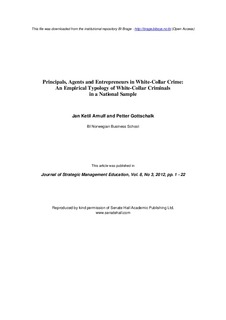Principals, agents and entrepreneurs in white-collar crime: An empirical typology of white-collar criminals
Journal article, Peer reviewed
Permanent lenke
http://hdl.handle.net/11250/93750Utgivelsesdato
2012Metadata
Vis full innførselSamlinger
- Scientific articles [2181]
Sammendrag
This study explores a nationally representative sample of 222 Norwegian white-collar
criminals in terms of the roles they and their victims had in their crimes. Establishing a typology
framework based on agency models, we point out the most frequent types of white-collar criminals
and their most profitable types of actions. Victims of white-collar crimes are mostly participants in
business transactions. As expected, top executives are a predominant group of white-collar criminals
and their most frequent victims are owners. However, another type of white-collar criminal coined
“entrepreneur criminal” turns out to be more frequent and making bigger profits in absolute and
relative terms. These work within smaller, less established companies with less transparent
governance and target a broad range of victims. Our data support the view that white-collar crime is
based on competence, not deviant dispositions, and poses real but to some extent foreseeable risks
to business strategies. Theoretical and practical implications are discussed.
Beskrivelse
This is the article as published in the journal, due to kind permission of Senate Hall Ltd. www.senatehall.com
